 Petzlover
PetzloverAustralian Cattle Dog is originated from Australia but Antebellum Bulldog is originated from United States. Australian Cattle Dog may grow 16 cm / 6 inches shorter than Antebellum Bulldog. Australian Cattle Dog may weigh 52 kg / 114 pounds lesser than Antebellum Bulldog. Both Australian Cattle Dog and Antebellum Bulldog has same life span. Both Australian Cattle Dog and Antebellum Bulldog has almost same litter size. Both Australian Cattle Dog and Antebellum Bulldog requires Low Maintenance.
During the 19th century, in the New South Wales, lived a cattle farmer Thomas Hall. He wanted to have a perfect cattle dog so he mixed two breeds: dogs used by stockman with the dingo. The new breed was given an interesting name - Halls Heelers. Heelers was a part of the dog breed because this new breed of the dog inherited the nipping instinct. As time passed, one breed was developing in two breeds: the Australian Cattle Dog and the Australian Stumpy Tail Cattle Dog.
The Australian Cattle dog can be found in two available colours: red and blue. This is how they got their nicknames: Red Heeler and Blue Heeler.
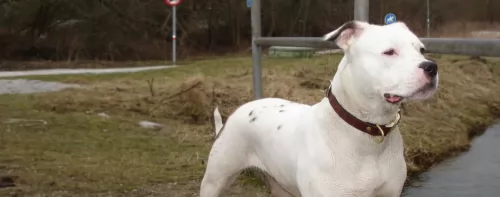 The history of the Antebellum Bulldog dates back the 1600s where it was used as a lasting solution to drive away hogs in rice plantation farms in Altamaha River in Georgia. After the plantation system became dominant in most parts of the United States, a majority of the farmers had to think of a more creative way of driving away wild feral pigs and cattle. Having caused multiple deaths to humans due to their massive bodies and extremely sharp horns, farm owners had no option but to employ bulldogs as the only means of security.
The history of the Antebellum Bulldog dates back the 1600s where it was used as a lasting solution to drive away hogs in rice plantation farms in Altamaha River in Georgia. After the plantation system became dominant in most parts of the United States, a majority of the farmers had to think of a more creative way of driving away wild feral pigs and cattle. Having caused multiple deaths to humans due to their massive bodies and extremely sharp horns, farm owners had no option but to employ bulldogs as the only means of security.
Although these dogs served their purpose of protecting their masters while still being family companions, their age of extinction came during the Civil War where the economy at the Altamaha region was permanently altered. After the fall of plantation farming and abolition of slavery, the Antebellum Bulldog became a forgotten breed something which led to its extinction. However, as years passed by, this rare breed was eventually reintroduced by the Maxwell family under strict guidelines by the Animal Research Foundation.
The Australian Cattle Dog originally mixed with Australian herding dog that was kept near the cattle to guide them. Medium-sized, with the short coat, this dog is generally easy to groom and maintain. It does require more brushing during the shedding period, but it is still not an everyday need. He is easy to train because he likes challenging games and activities which are. It gets very attached to its owner, and he is always protective of them and their possessions. The most common health problems happen with their ears and eyes, but they are usually very healthy and they have a long life – up to 15 years.
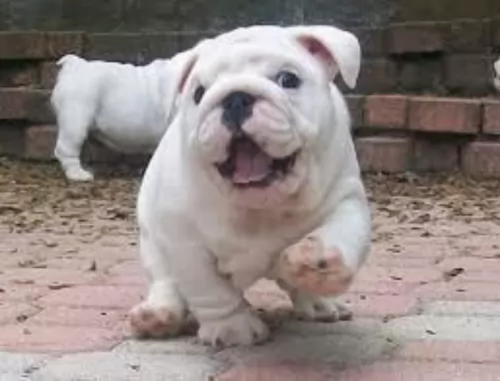 The Antebellum Bulldog is a recently introduced breed that was developed with an aim of recreating the historic working bulldog or Southern breed. First introduced in the United States, this bulldog was initially bred to be used as a working dog in rice plantations in Altamaha River Valley, a region in South East Georgia.
The Antebellum Bulldog is a recently introduced breed that was developed with an aim of recreating the historic working bulldog or Southern breed. First introduced in the United States, this bulldog was initially bred to be used as a working dog in rice plantations in Altamaha River Valley, a region in South East Georgia.
By nature, the Antebellum Bulldog is an extremely loving, loyal, affectionate, and very intelligent pet. Due to that reason, this breed is a perfect choice for a family dog. If we can get back to history, it’s evident that this dog breed was used in plantation farms to secure the rice from damages caused by cattle and wild hogs. Relating these tasks to the dog’s overall personality, you will find that indeed the Antebellum Bulldog is one such breed that can be trusted as a watchdog in today’s homes.
The Antebellum Bulldog is very similar to the American Bulldog only that it’s a little bit larger and bulkier with a proportionally bigger head. These breeds usually range from bigger to biggest with males weighing around 36 to 68 Kg (80—150 pounds) and females 32 to 50 Kg (70—110 pounds). Similar to the American Bulldog, the Antebellum Bulldog has a rough coat, long legs, an athletic body and short tail/ears that don’t require any cropping.
Despite of their intimidating appearance, the Antebellum Bulldog is an extremely loving, passionate, and loyal pet that will suit perfectly as a family dog. These dogs will lie down to their masters and will need nothing more than constant company. According to professional breeders, the Antebellum Bulldog is most likely to form a close attachment to one member of the family although they still do enjoy hanging out with the rest of the family members.
As it is the case with most American Bulldogs, the Antebellum Bulldog has a very strong protective instinct that makes it react violently when strangers step into its territories. Something else you need to know about this Bulldog breed is that it does get along well with kids to a point of being overprotective. Since puppies are usually over playful, adults are highly advised to watch out as they can accidentally bowl or knock over your toddler.
The Antebellum Bulldog doesn’t have to be professionally groomed as is the case with most dog breeds. Apart from a weekly brushing of the coat, the other grooming needs you’re supposed to observe include; regular brushing of the teeth and trimming of nails from an early stage.
Children and Australian Cattle Dogs can grow up together in harmony. They will have a loyal and protective companion. After you properly train your dog and teach your child how to play with the dog, you will bring the friendship on the safe side. Some of them will have the instinct to nip at heels, so you should pay attention to this while training your pet.
Special talents: cattle dog, service dog, therapy dog, police dogs, drug detection dogs.
Australian Cattle Dogs can survive cool, hot and temperate conditions. They can live in a shelter outdoors, and they do well living indoors. But, be aware – without enough physical activity, this dog will end up being frustrated and unhappy.
They will absorb every new trick so quick that you will be amazed. They love to learn, and if you start with some good trick you will raise a great friend and maybe a great competitor in fetch, swim, bring-a-stick, or run-the-show dog sports.
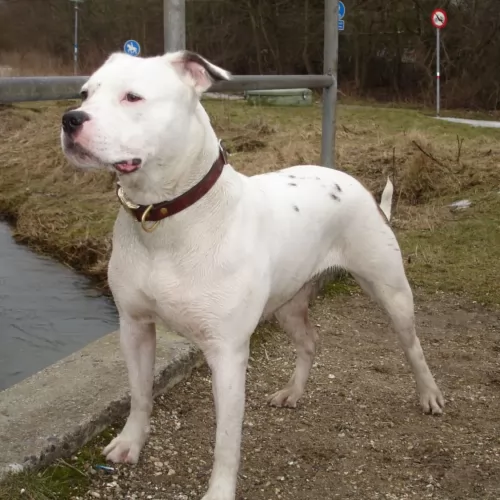 Although the Antebellum Bulldog is quite intimidating, this dog can make a great pet thanks to its loving, patient, and extremely tolerant characteristics. This dog enjoys playing with young children as well as other members of the family although proper care should be observed to avoid injuring young toddlers due to their muscular bodies.
Although the Antebellum Bulldog is quite intimidating, this dog can make a great pet thanks to its loving, patient, and extremely tolerant characteristics. This dog enjoys playing with young children as well as other members of the family although proper care should be observed to avoid injuring young toddlers due to their muscular bodies.
The Antebellum Bulldog is a protective dog breed with very strong guarding instincts. New visitors will have to be very careful as these dog breeds are quite wary of strangers and will not treat them politely. However, if you become familiar with them, they are likely to know you and later accept you as part of a large family.
Speaking of adaptability, the Antebellum Bulldog is more of a working dog than a household pet. Although some people will prefer to keep them indoors, always ensure that your homestead has a backyard where they can exercise. Otherwise, these dog breed will prefer to be kept in rural areas where there are vast tracks of land for them to play on.
Finally, the Antebellum Bulldog is an intelligent dog with a very sharp memory. However, due to their extremely playful nature, they can become very stubborn and messy. Therefore, owners are advised to train them early enough before they are fully grown.
Health Problems: are mostly inherited. You can avoid this by searching for a good breeder that can clear out the hereditary diseases.
The Australian Cattle Dog is one of the breeds that can be born with progressive retinal atrophy. Progressive rod-cone degeneration is a disease that causes the rods and cones in the retina of the eye to degenerate. It might lead to blindness.
The Australian Cattle Dog is one of the rare breeds with recessive piebald alleles. This gene is the reason why they have white colour on their coat. But, unfortunately, this gene can be the reason why congenital hereditary deafness develops.
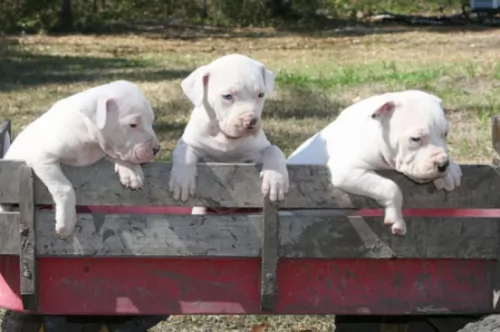 The Antebellum Bulldog has a life expectancy of 12—15 years. Recognized as an emerging breed, this dog doesn’t have many health problems as compared to most other dog breeds. Although these dogs are muscular and very athletic, these breeds suffer from various health conditions which are caused by the nature of their coat. Among the common health problems of the Antebellum Bulldog include
The Antebellum Bulldog has a life expectancy of 12—15 years. Recognized as an emerging breed, this dog doesn’t have many health problems as compared to most other dog breeds. Although these dogs are muscular and very athletic, these breeds suffer from various health conditions which are caused by the nature of their coat. Among the common health problems of the Antebellum Bulldog include
One major health problem that affects blue-eyed dog breeds (such as this one) is possible blindness. This condition is usually caused by diabetes, hypertension or Cushing’s syndrome. To treat this condition, you need to take your dog for regular veterinary checkups to know the root cause of the problem.
Another health problem that is very familiar with most Antebellum Bulldogs is hip dysplasia. Since these dog breeds are usually muscular and very huge, this condition is most likely to affect them, especially at an early stage. Dog owners should, therefore, be very familiar with this condition and should take their pets for regular veterinary tests to avoid it.
Herding dog have a history of the joint diseases. That’s why some of the pet suggest feeding a herding dog with meat like chicken, turkey, beef, lamb and fish. Dry dog food, even premium quality, may not be enough for this energetic dogs and their bone structure. But it depends on the dog. The best advice is to always take an advice from your breeder or your wet.
You won’t be very busy with grooming your Australian cattle dog. You don’t have to take everyday care of it. Occasional brushing will be more than enough. Bath the dog only when you notice odour problem.
The Australian Cattle Dog needs a high level of activity. Like many other herding dog breeds, they love walks, spending time with people, running or doing any athletic sports with them, teaching them tricks since they have above average intelligence. Fetching will be super fun for everyone, agility, competitions or any other challenging activity. They love water and they swim very well so you can take the dog with you to the nearest pool and have a great time.
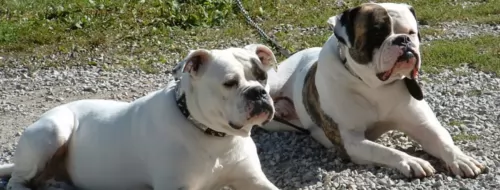 Feeding an Antebellum Bulldog is much similar to feeding other dogs. Owners are highly advised to stick to high-quality hypoallergenic diets that are rich in vitamins and nutrients. Now, since Antebellum Bulldog puppies are usually playful, feeding them with high nutrient food thrice a day will really help. Always avoid feeding your puppies with processed foods or foods with artificial sugars as they can expose the puppies to severe health problems.
Feeding an Antebellum Bulldog is much similar to feeding other dogs. Owners are highly advised to stick to high-quality hypoallergenic diets that are rich in vitamins and nutrients. Now, since Antebellum Bulldog puppies are usually playful, feeding them with high nutrient food thrice a day will really help. Always avoid feeding your puppies with processed foods or foods with artificial sugars as they can expose the puppies to severe health problems.
When feeding senior Antebellum Bulldog, there are some small changes you’ll need to make. First, these dogs will require high-quality foods that are easy to digest. Wet foods are perfect for Antebellum Bulldogs as they will help to keep them hydrated. Buy dog foods low in calories and rich in essential vitamins and nutrients to match your dog’s energy.
Antebellum Bulldog can add extra weight if proper care is not observed when feeding them. Due to this reason, these dogs should be fed depending on their level of activity to avoid cases of obesity.
Since their ancestors were used to guard rice plantations in Altamaha, Antebellum Bulldogs are very energetic and highly suited in rural settings over indoor lifestyle. However, if you decide to keep these dogs as pets in your households, it’s advisable that you provide them with some playing space in the backyard.
When it comes to training the Antebellum Bulldog, owners are advised to train them to be obedient at an early stage as they can get really stubborn in the future. These dogs are very intelligent and they never forget what they learn once they’ve mastered it.